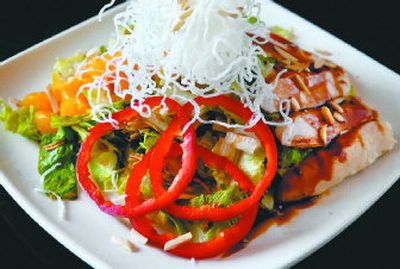on fats

This is your heart on French fries:
Inflamed. Clogged with “bad” cholesterol. Lacking “good” cholesterol.
In short, not a pretty picture.
That’s because, traditionally, many French fries – as well as commercial baked goods, restaurant fried foods, margarines and other processed goodies – were filled with trans fats.
But that’s changing.
Starting last year, the government required trans fats to be listed on all food packaging. Many companies set about removing the fats from their products.
And now restaurants are following suit.
McDonald’s is testing a trans fat-free cooking oil for its fries. Ditto for Burger King. The Marriott Hotel chain, Wendy’s, Taco Bell, Starbucks and others are stripping trans fats from their menu items.
“I applaud restaurants for making that switch because obviously, America is obese and we need to do everything we can, even if it’s in small increments, to make those changes,” says Patty Seebeck, a Rockwood Clinic dietitian and an instructor at the Inland Northwest Culinary Academy at Spokane Community College.
Think of trans fat as the bogeyman of dietary fat. Saturated fats are pretty evil, too, but many scientists consider trans fats the nastiest of all. They’re so bad for you that there’s not even a recommended daily amount you’re supposed to consume. (Unless you consider zero to be a recommended amount.)
Trans fats are born during the process of hydrogenation, in which polyunsaturated oils are made into a shelf-stable, solid fat product.
Trans fats are cheap. They produce consistent results. And they keep for a long time. That’s why restaurant chefs turn to them so frequently, Seebeck says.
“Their first intent was not to make us all die,” she says.
Like saturated fats, trans fats raise blood cholesterol levels. Some studies have shown that trans fats cause an even greater rise than saturated fats. Plus, trans fats lower HDL or “good” cholesterol in the blood, according to the American Heart Association.
Prospectors Bar and Grill, with two locations in Spokane, is not exactly known for health food. Entrees come served on platter-sized dishes. There are giant hamburgers, heaping piles of chips and desserts that could feed a family of four.
But for the last six months, the restaurant has reworked the recipes on its 110-item menu to be trans fat-free, says Mike Didier, who owns the business with his wife, Cheryl.
“People are so health-conscious anymore,” Mike Didier says. “We’re focusing on that family that wants to come in and the mother wants to feel really good about what they give their children.”
The frying oil is no longer hydrogenated. They’ve switched brands of breaded chicken breast and Texas red chili. The bread bowls are free of trans fats.
“It’s more expensive,” Didier says. “That’s why it’s so hard to convert … I’m absorbing that right now.”
About a year ago, Spokane’s HearthBread BakeHouse became trans fat-free, says Larry Condon, the company’s CEO. To do so, the commercial bakery had to alter about 100 of its 400 products, especially the pastries.
“We basically had to reform everything,” Condon says.
While some national chains and local establishments work on getting trans fats off the menu, others never used them in the first place.
Twigs Bistro and Martini Bar has never used oils or other products with trans fats, says Heath Barden, assistant general manager for the north side location.
“It’s not something we really talk much about,” Barden says. “It’s not a huge deal. We want to use the freshest ingredients possible.”
It’s much the same case at Wild Sage in downtown Spokane, which emphasizes locally grown, often organic, ingredients, says David Wells, one of the owners.
“We came into our business with the cleanest foods we could open ourselves up with,” Wells says.
Steering clear of trans fats is a good thing, to be sure. But there’s more to healthy eating than just that. Calories count, too. And too much saturated fat isn’t any good for you, either.
“Consumers just shouldn’t be eating large amounts of French fries whether they use oils that have trans fats or not,” Seebeck says.